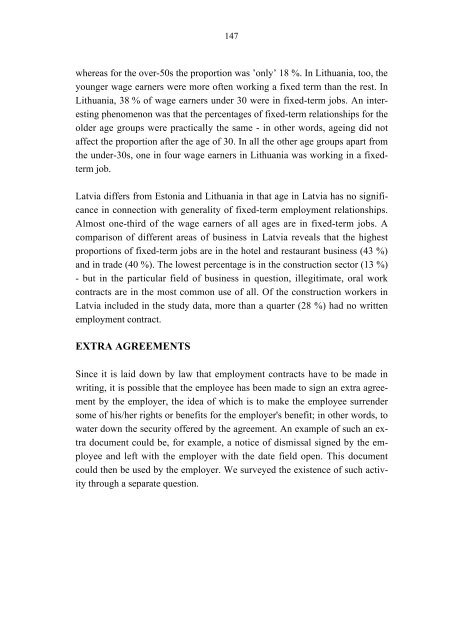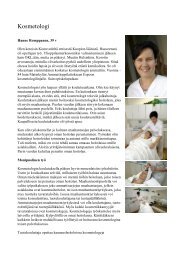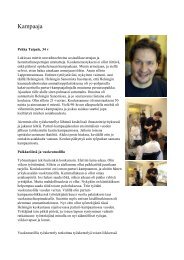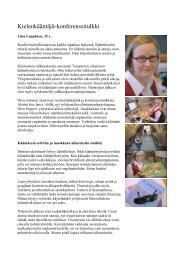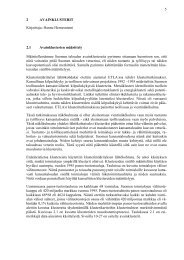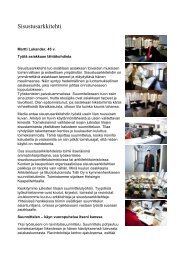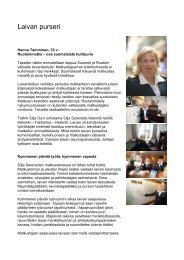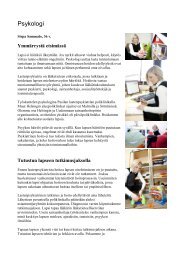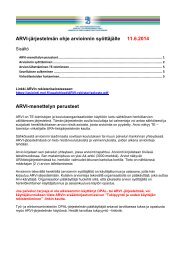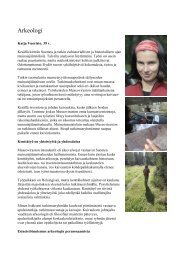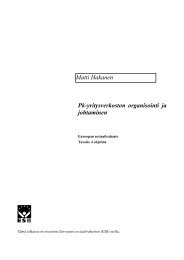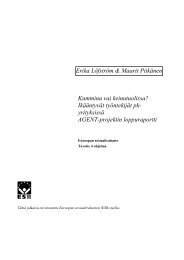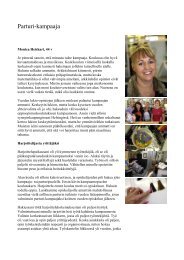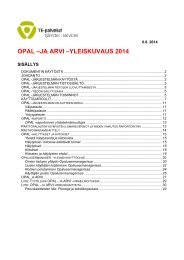Working Life Barometer in the Baltic Countries 2002 (pdf) - mol.fi
Working Life Barometer in the Baltic Countries 2002 (pdf) - mol.fi
Working Life Barometer in the Baltic Countries 2002 (pdf) - mol.fi
Create successful ePaper yourself
Turn your PDF publications into a flip-book with our unique Google optimized e-Paper software.
147<br />
whereas for <strong>the</strong> over-50s <strong>the</strong> proportion was ’only’ 18 %. In Lithuania, too, <strong>the</strong><br />
younger wage earners were more often work<strong>in</strong>g a <strong>fi</strong>xed term than <strong>the</strong> rest. In<br />
Lithuania, 38 % of wage earners under 30 were <strong>in</strong> <strong>fi</strong>xed-term jobs. An <strong>in</strong>terest<strong>in</strong>g<br />
phenomenon was that <strong>the</strong> percentages of <strong>fi</strong>xed-term relationships for <strong>the</strong><br />
older age groups were practically <strong>the</strong> same - <strong>in</strong> o<strong>the</strong>r words, age<strong>in</strong>g did not<br />
affect <strong>the</strong> proportion after <strong>the</strong> age of 30. In all <strong>the</strong> o<strong>the</strong>r age groups apart from<br />
<strong>the</strong> under-30s, one <strong>in</strong> four wage earners <strong>in</strong> Lithuania was work<strong>in</strong>g <strong>in</strong> a <strong>fi</strong>xedterm<br />
job.<br />
Latvia differs from Estonia and Lithuania <strong>in</strong> that age <strong>in</strong> Latvia has no signi<strong>fi</strong>cance<br />
<strong>in</strong> connection with generality of <strong>fi</strong>xed-term employment relationships.<br />
Almost one-third of <strong>the</strong> wage earners of all ages are <strong>in</strong> <strong>fi</strong>xed-term jobs. A<br />
comparison of different areas of bus<strong>in</strong>ess <strong>in</strong> Latvia reveals that <strong>the</strong> highest<br />
proportions of <strong>fi</strong>xed-term jobs are <strong>in</strong> <strong>the</strong> hotel and restaurant bus<strong>in</strong>ess (43 %)<br />
and <strong>in</strong> trade (40 %). The lowest percentage is <strong>in</strong> <strong>the</strong> construction sector (13 %)<br />
- but <strong>in</strong> <strong>the</strong> particular <strong>fi</strong>eld of bus<strong>in</strong>ess <strong>in</strong> question, illegitimate, oral work<br />
contracts are <strong>in</strong> <strong>the</strong> most common use of all. Of <strong>the</strong> construction workers <strong>in</strong><br />
Latvia <strong>in</strong>cluded <strong>in</strong> <strong>the</strong> study data, more than a quarter (28 %) had no written<br />
employment contract.<br />
EXTRA AGREEMENTS<br />
S<strong>in</strong>ce it is laid down by law that employment contracts have to be made <strong>in</strong><br />
writ<strong>in</strong>g, it is possible that <strong>the</strong> employee has been made to sign an extra agreement<br />
by <strong>the</strong> employer, <strong>the</strong> idea of which is to make <strong>the</strong> employee surrender<br />
some of his/her rights or bene<strong>fi</strong>ts for <strong>the</strong> employer's bene<strong>fi</strong>t; <strong>in</strong> o<strong>the</strong>r words, to<br />
water down <strong>the</strong> security offered by <strong>the</strong> agreement. An example of such an extra<br />
document could be, for example, a notice of dismissal signed by <strong>the</strong> employee<br />
and left with <strong>the</strong> employer with <strong>the</strong> date <strong>fi</strong>eld open. This document<br />
could <strong>the</strong>n be used by <strong>the</strong> employer. We surveyed <strong>the</strong> existence of such activity<br />
through a separate question.


